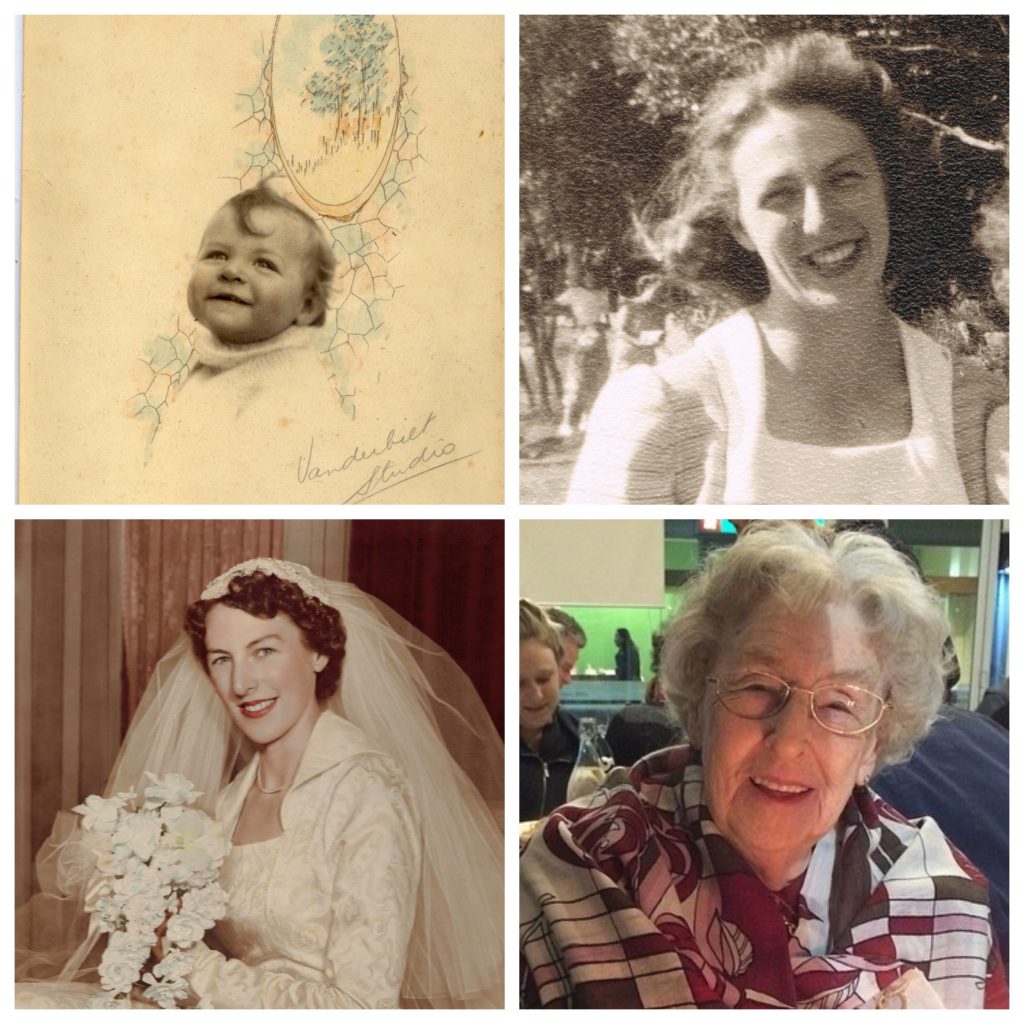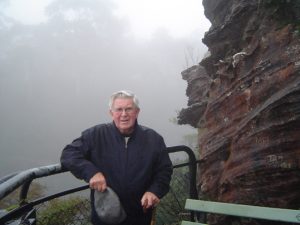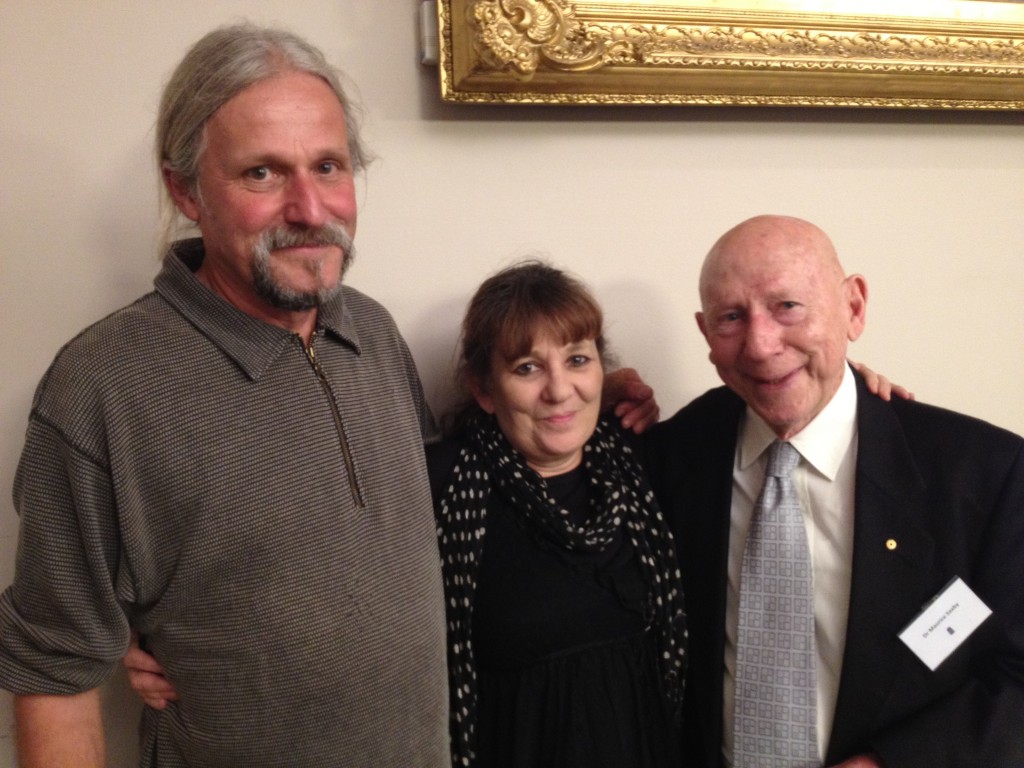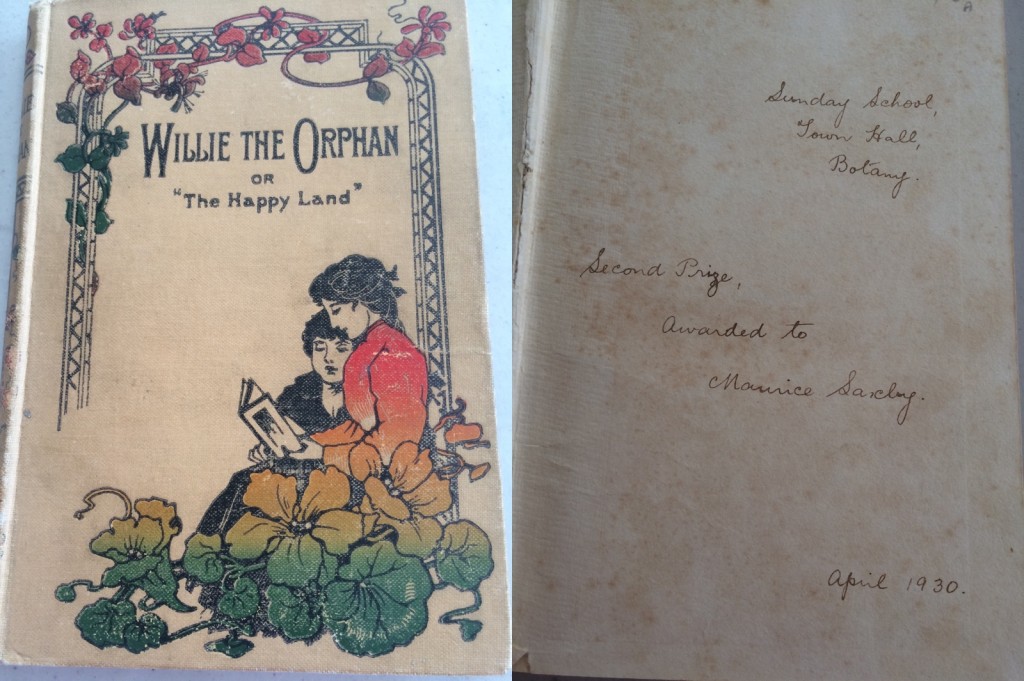This is the eulogy my sister Alison gave for our mother at her funeral today. It is a word-perfect honoring of Mum’s long life. You can watch the video of the slideshow I made for the service on YouTube.
Edith Betty Ridge, nee Dykes, was born on May 8th 1928 in Enfield. She was the first born child and only daughter to Stanley and Grace and lived at home in Russell Lea until her marriage. Her brother Ronald “Ronnie” was born in 1931. Mum’s childhood was happy and carefree. Despite growing up through the depression years her family were comfortable as Stanley, Pa Pa to his grandchildren, remained in employment as a clerk with the Gas Company. Pa Pa was at the Gallipoli landings and his war service combined with his personality could make him prickly. This was balanced though by the gentle and loving nature of Grandma with whom Mum shared a very close relationship. Mum would always buy her Mother bunches of violets when they were in season. Mum also had a close and loving relationship with both of her Grandmothers and her Aunty Glad, Grace’s sister, and her husband Uncle Herb. Sadly, she had no memory of her Grandfathers. Her cousin Tom Treseder was extremely special to her. Mum and Ron were always great friends despite the fact that he could be a typically annoying younger brother. With her oldest friend Olwyn, Mum and Ron formed their own secret club known as The Gumnut Club, complete with passwords, certificates and minutes kept by Madame President which Mr Treasurer was to read. Mr Treasurer preferred to be pulling the wings off cicadas!
Family holidays and car trips to the beach and The Blue Mountains with friends were a regular occurrence, and one very special trip to Tasmania brought about a lifetime of wonderful memories. The family had a gorgeous red setter called Dookie who was adored adored and he gave Mum enormous joy. Growing up we heard so many stories about Dookie, it was almost as if we also knew him.
Mum attended school at Russell Lea Infants, Drummoyne Public and then Fort St Girls High where she told me she read every book in the library and would then go to the City Library after school. Mum was an extremely intelligent woman, but sadly her brain was, as my sister Judy succinctly described it, untrained. The Headmistress at Fort St was a Maths teacher and as Mum was not mathematically inclined she was placed in 4D despite good results in the Intermediate Certificate. Mum excelled in English and she enjoyed French and Latin, but could not pursue these in 4D. So she decided that she wanted to leave school. PaPa said if you get a job you can leave. Mum being Mum, head strong and determined, did just that. In 1944 she immediately gained employment as a punch card operator with the Sydney County Council and she remained there until her marriage 10 years later. Mum enjoyed her working life, and as a young woman stepped out socially with friends to the theatre, concerts and movies. She was an excellent knitter and dressmaker, and completed beautiful embroidery. Mum attended elocution classes with Miss Pilsbury and acted in a few plays, one of which saw her take top billing over the late Ruth Cracknell!! Mum was always complimented on the beautiful way that she read, particularly scripture readings. She attributed this to reading stories to her children, but no doubt the elocution classes were a factor also.
She was a member of the Drummoyne Methodist Church and socialised with her friends there with picnics, playing tennis and “socials”. She scored at baseball games and looked after all the player’s watches, wearing them up her arm! She loved being a member of the Methodist Crusader Choir and performing in the Sydney Town Hall was always a big event. Crusader Camps were always a lot of fun. Mum was an excellent flower arranger and adored flowers. In recent times I swear that Mum spent more on flowers every week than she did on food! But they always brought her enormous joy and the home was always beautiful and welcoming. She was an avid crossworder, and her day did not begin until she had started the crossword in the Sydney Morning Herald. Up until her eyesight failed her in February/ March, she was still completing the crosswords.
Mum was a good cook but I don’t think she particularly enjoyed cooking. It was tiresome trying to think of interesting food to prepare for 4 ratty kids in the 70’s! She did become quite modern and creative with Rice a Riso and a mince cabbage dish called Kye Si Min which we loved. Sunday roast dinners were special, macaroni cheese and chicken of the sea were family favourites and we loved her mocha cake particularly. Dave fell in love with Linda over mocha cake! Mum was able to move with the times becoming quite computer literate, and having an I pad has been her way to stay engaged and connected to the world via Facebook and emails. Unfortunately she also mastered the art of online shopping….. Sigh!
On the topic of shopping, Mum loved to shop!! She loved beautiful things be it pretty china, interesting pieces, jewellery, books, & music. As you all know she was always beautifully dressed with matching accessories. As a young woman she had immaculate taste and style. Over the years it has been a running source of family indignation that she was a shopaholic but she didn’t care! I would often quip that she was spending my inheritance to which she would reply, “That’s right”!! The last time we were in a shopping centre Mum picked up the latest Prouds catalogue & proceeded to pick out the items she was interested in. In the family we joked about “Mother’s millions”, her jewellery collection. Mum could be quite inappropriate at times, much to Dad’s dismay, and like her Dad she could be prickly. She was human. Mum had the most incredible and long memory. She had an amazing ability to recall names, places, dates. She could tell you where she purchased a dress, how much it cost, who was with her when she bought it and where she wore it! As I have been piecing together family history in recent years her wonderful memory was invaluable. Mum also had the most infuriating but endearing ability to tell a story. She would take you all around the world and there would be a cast of thousands in it, the relevance which was often a puzzle to us. Dad would say “Edith, get to the point” and she would retort “Oh Barry, do be quiet”. She would then happily continue on with her tale, gaily ignoring Dad, but she always came back to the point!
Mum made friends wherever she went, and once you were her friend you were her friend for life. Over the years she lost Olwyn, Elizabeth, Joan, Joy, Vonnie but their memories live on. Weekly chats with Norma continued until the very end, and Katie and Barbara, Lyn and Sue, Anne & Laurie, Judith & Jan, Christo and “my friend Pamela” have remained in constant contact. Friends made in more recent times have been a source of encouragement and support and she was so grateful for this. Her cleaner from Just Better Care, Grace, was very good to Mum and Mum was very fond of her. There have been many beautiful messages of love and support on Facebook, and people have been sharing special memories & thanking Mum. The word gracious was used frequently. We were particularly touched by several posts where people thanked Mum for the support and encouragement she extended to them after they emigrated to Australia. Thank you to all of you, so many and I don’t want to forget anyone, but you know who you are. Special thanks must go to Professor Ray Sacks, Dr Lena Reichardt, Dr Mark Fitzmaurice, the radiation oncology team at RNSH in particular Dr DJ, Dr Lisa Parker, and CNC Paula McLeod. Rev David Reichardt and Rev Bill Ives. Deepest gratitude to the staff at Bowden Brae nursing home who tended to Mum in her final weeks including the chaplains Tennyson & Frank. Extra special thanks to all the nursing, medical, auxiliary staff at Neringah Palliative Care Hospital & their community outreach team. Jo Manouk, pastoral carer, thank you so much.
Mum’s faith has been at the very core of who she is and what she stood for. When she was 14 she became a member of the Methodist Girls Comradeship and at the age of 16 she was taking Sunday School classes. Her lifelong journey of service all progressed from there. Her biodata (hold it up) reads like a Tolstoy novel and if I was to mention every committee served on, position held, job taken on, services conducted we would be here all day. Mum summed it up in one of the many talks she gave – she served 36 years in country and city circuits/parishes and was the leader of 36 fellowship groups. She served at Synod and Assembly level, district and national level. She was the President of Australian Church Women in both the ACT and NSW and is a Life Member, an honour of which she was aptly very proud. Retirement didn’t slow her down – what retirement? She was as busy as ever with various women’s groups, Uniting Church Adult Fellowship of which she was also a life member , Synod Committees and editor of several newsettes/handbooks. Australian Church Women and The Fellowship of the Least Coin were very dear to Mum and there is a collection box outside if you would like to make a donation to The Fellowship of the Least Coin. Due to illness and then Covid19 Mum was unable to attend church for some time, and this was a source of distress to her. Thank you to the Normanhurst Uniting Church community for faithfully and lovingly staying in touch.
Mum’s life changed when she made the move to Five Dock Methodist Church and commenced teaching Sunday School there. It was 1950. George Ridge, the Sunday School Superintendent, spotted her and immediately decided that she was the girl for his son Barry, who was serving as a probationary minister in the North West Mission, based at Boggabri. What a fantastic match maker Grandad turned out to be!! Edith and Barry met, fell in love, and the rest as they say is history!! They were married at Five Dock Methodist Church on December 4 1954 by the Rev C.L Connor, after a terrific thunder storm saw the beautiful bride unable to leave the house, making Dad an extremely anxious groom in waiting. Honeymoon spent at beautiful Jervis Bay, and then the newly married couple set off for their first appointment to Milton. Not before Mum had all of her teeth pulled in one sitting, as per the recommendation at the time due to a lack of country dentists. Mum & Dad were welcomed to Milton with a lovely afternoon tea spread of cheese and tomato on Sao biscuits. Poor Mum. You could say she gave her teeth for the church.
There was no training to become a Minister’s wife and Mum learnt as she went along. She was well supported by the older Minister’s wives, and as a couple Mum and Dad received loving Christian support from Rev Connor & his wife, Dr George Wheen and the Rev Stanley Bowyer Hayward (Principal of Leigh College where Dad studied) & his wife Kathy. After Milton they went to Gunning, Toronto, Katoomba, Auburn, Yarralumla in the ACT and finally Homebush-Strathfield. Mum and Dad were an awesome team and served the church faithfully. Mum learnt to make do with parsonage furniture and she shared Dad without complaint with the people and places that needed him. There were hard years, and disappointments along the way. God’s lemon drops are everywhere. However, there were also many, many fun times. Mum could do a wicked Nana Moskouri impersonation and she rather enjoyed some of Meatloaf’s music (whom she famously called Meatball!) When she wagged the finger or threatened to knock our heads together we knew we were in trouble or would soon be if we didn’t tow the line. Mum battled several major health issues over the years, but always came out on top until the final illness. Her strength of character and determination were incredible.
Mum & Dad were married for 62 years and were devoted to one another. Mum loved & respected Violet & George, her in laws deeply, and they always referred to her as their daughter & she called them Mum & Dad. Mum told me that she hit the jackpot when she married into the Ridge family, and she was loved in return by members of the extended family. Linda was born in 1956, David in 1959, myself in 1961 and Judith rounded off the family in 1964. We had several cats, 2 rabbits, fish and 2 budgies in the family at various times. We had wonderful holidays at our holiday home at MacMasters Beach, the deposit on which was supplied by Mum’s long service leave pay out. We watched family TV shows such as The Bobby Limb Show, Bandstand, Seekers specials, Happy Days & Countdown and ate saucepan cooked popcorn. We also watched Division 4 & Homicide! Surprising, I know! Mum famously said “No swearing in my kitchen” in response to some very tame swear words that were said on these programs. We saw live shows such as Godspell & Jesus Christ Superstar and went to lots of movies. We were not a wealthy family in money terms, but in every other way we were millionaires. One of my favourite memories growing up was sitting at the dinner table and talking about our individual day. Mum was always engaged and interested in our lives, our friends, our interests and our thoughts on the world. She loved us unconditionally and was always supportive, allowing us to make mistakes without judgement. Her standard greeting was always “Hello love” and these were the last words she spoke to me. Mum was surprisingly open minded and forward thinking for a woman of her generation and background. She believed firmly in women’s rights and had a very strong sense of social justice. She welcomed and loved our respective partners – Dave, Pauline and Bernard and made strong friendships with their respective families. Mum was a loving aunt to Margot & Wayne, and Elizabeth, and to Ron’s stepson Paul and his wife Liz and their children. It brought her so much joy when Margot reconnected with her.
The adored grandchildren came along and Mum couldn’t have been a more wonderful grandmother if she tried. She played soccer with Peter which coined the infamous saying “Peter kicks, Grandma runs!It never ceased to amaze me how my children could get away with anything with Grandma – things she would not have accepted from me! Peter & Emelia, Heather & Cliff, Alice & Keaton, Emily, Lucy, James & Alex and Grace and Glen. Grandma was so proud of all of you and watched you grow and make your way in the world with deep satisfaction. She was keenly interested in all that you did and did her best to be there for you as much as possible. Thank you for your phone calls and visits, Mum was so grateful.
Just when we thought our lives couldn’t get any better along came the crème de la crème for Mum – the Great Grandchildren! Move out of the way everyone else. Nothing could compare to Bennett, Isaac and Zarahlinda! Boy, was she one besotted Great Grandma. She lapped up every snippet of information about them that came via Facebook or phone calls, and loved every photo and video. When she was able to spend time with them in person either in Coffs Harbour or when they came to Sydney it was a really joyous occasion. Ben, Zaccy & Zara know that Great Grandma loved you very, very much.
Mum faced her illness bravely with dignity and grace. She never said ” Why me?” She wanted to know exactly what would happen and she accepted it. Mum wasn’t ready to die; she had so much to live for. She had purchased a lovely outfit to wear as Grandmother of the bride for whichever of her Grandchildren was going to make the next trip down the aisle. But her faith saw her slip away quietly and peacefully.
Mum had a very distinctive walk – she could really stride it out with vigour in her younger years. You knew the sound of her footsteps before you saw her. I imagine that she strode home to God with delight and all the energy of the 16 year old Sunday School teacher. She is now resting in the Peace that surpasses all understanding and her earthly struggles are no more. To quote Dr George Wheen in a letter he wrote to her – “A little faith will bring you to heaven, but a great faith will bring Heaven to you.”
Sleep well, our darling mother.










